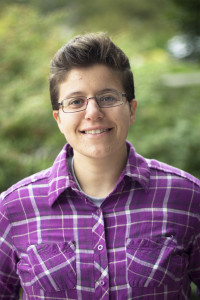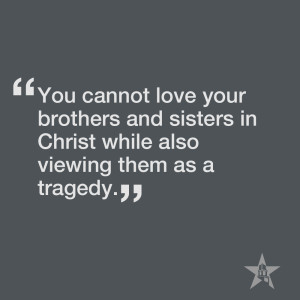Last semester I was invited to participate in a faculty, staff, and student focus group regarding how Houghton can best serve “same-sex attracted” students committed to celibacy. I was asked to be a part of the discussion as a representative of LGBTQ identified students who are open to same sex relationships. Other participants hoped I could provide insight into ways Houghton College, as a traditional institution, could support these students as well. However, it soon became apparent to me that, the way things stand now, Houghton College is unable to fulfill this ideal.

Most of us wish our sexual ethics weren’t so divisive; why do the actions of adults in their own bedrooms have to affect our friendships, our politics, our faith?
Some of us may also feel disturbed by this whole matter. Why are the LGBTQ students so upset? It’s not like they’re being stoned. They’re just being asked to live by a “traditional” standard. How could that possibly be insulting or hurtful?
I won’t pretend this isn’t complicated. But I will say that if one holds a traditionalist perspective and also desires to “reach out” to LGBTQ people, perhaps try putting a camel through the eye of a needle first.
Most traditionalists (in this case, someone who thinks sexual expression ought to be limited to heterosexual marriage) do not actively advocate the physical or mental abuse of LGBTQ people. They don’t have to. The idea that being LGBTQ is a tragedy, a result of the fall, an embarrassment, an abomination, is enough. This poor theology has created a roadmap of self harm scars. It has divided families, broken up churches, and justified the removal of gifted and sincere leaders from campus ministries.
You cannot love your brothers and sisters in Christ while also viewing them as a tragedy. You certainly cannot build relationships with them.
An example: the Counseling Center recently hosted the 9th annual relationship retreat. Only opposite sex couples attended this year, as with every other year. The retreat, as always, was heavily advertised through various media, including The Star. Meanwhile, Houghton College is considering adding clarifying language to the Community Covenant which would make handholding between two men or two women suspect and grounds for a meeting in the Student Life office.
 Our community tells straight couples that their sexual desires are (or can be) beautiful, holy, worthy of public celebration. Yet it tells queer couples that one of their most human qualities, the longing to become one flesh with their beloved, is to be dealt with swiftly behind closed doors. On the one hand, affirmation and love, and on the other, shame and suspicion.
Our community tells straight couples that their sexual desires are (or can be) beautiful, holy, worthy of public celebration. Yet it tells queer couples that one of their most human qualities, the longing to become one flesh with their beloved, is to be dealt with swiftly behind closed doors. On the one hand, affirmation and love, and on the other, shame and suspicion.
Sometimes, when I speak about this publicly, I am told that LGBTQ/ progressive students don’t have to attend Houghton. They can just leave; after all, this is a “voluntary community.” Let me remind those who are ready to post such a sentiment on YikYak that any Christian community is subject to the entire Body of Christ. When fellow Christians critique the actions of other Christians, particularly regarding issues of justice and love, the proper response is not “you’re welcome to leave,” but rather, “Please, join us at the table. Teach us how to love you.”
I know this sets up an ultimatum: values or people? I’m inclined to choose people, but I understand what’s at stake for traditionalists: their interpretation of Scripture, their churches, their whole worldview. All difficult things to question. But this community cannot last much longer sitting on the bubble, attempting to please both “sides” of this issue. There are real, vulnerable people caught in the crossfire. Christ is standing at the door, knocking; it’s time for Houghton College to open the door to LGBTQ voices.
Micah is a senior theology major.
